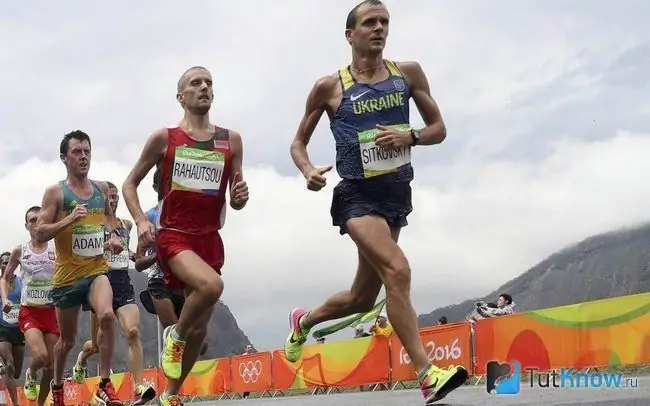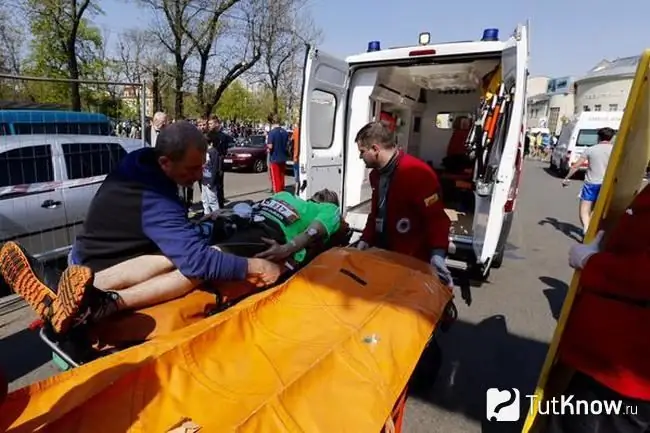Find out what scientists have found in recent research on runners and why these athletes are more likely to die on the run. Many people believe that running marathon has nothing to do with health promotion. Of course, first of all, we are talking about those huge physical exertion that the body is forced to experience during the race. Suffice it to recall that women were only allowed to compete in the marathon at the 1984 Olympics. However, there are those who run irregularly, but at the same time believe that they are able to cover a distance of 42 kilometers.
It should be remembered that an unprepared body may not withstand high loads. Often it is the overestimation of one's own strengths that is the answer to the question of why they die from running. According to the results of scientific research, if a marathon runner overcomes the distance at a speed of 3 minutes / km, then the body needs to accelerate the energy production processes fifteen times.
With such a running speed, the marathon distance will be covered in more than two hours. If, on the other hand, it takes four hours to cover the entire distance, then the metabolism should be increased tenfold. This suggests that the athlete must have a well-developed cardiorespiratory, muscular and endocrine systems. It is now becoming clear why Phidippides was the first person to be killed by the marathon. However, modern science has made it possible to find out about the load that awaits runners.
What stress does the body experience during a marathon run?

We all remember from school history lessons what happened to Phidippides. However, some scientists do not share confidence about what actually happened then. Be that as it may, but every year several marathon runners repeat the fate of the ancient Greek warrior and the question of why they die from running does not lose its relevance.
To answer it, we first need to figure out what kind of stress the body has to experience during the race. Back in 1976, a scientific conference was held on the physiology of marathon running. The most daring was the theory put forward by Dr. Tom Bassler. In his opinion, due to strong loads, the walls of the vessels are reliably protected from the process of accumulation of lipoprotein compounds on them.
Simply put, marathon running can be a good way to prevent coronary artery disease of the heart muscle. Bassler compared long-distance runners to the warriors of the Tarahumara Indian tribe as well as the Maasai. In representatives of these peoples, deaths due to heart ailments are extremely rare. All of them lead a healthy lifestyle and eat only healthy foods.
Bassler analyzed the causes of death of marathon runners over the past decade and stated that none of the athletes died due to coronary heart disease. Among the main reasons for the death of athletes, Bassler noted diseases of the heart muscle that are not associated with atherosclerosis. However, during the same conference, the audience gave three examples of death, which was caused by coronary artery disease. Bassler's main opponent was Dr. Knox.
In 1987, during his presentation, he backed up his position with 36 more examples of marathon runners dying from acute myocardial infarction. After considering 27 deaths of athletes during a marathon, only two of them were not associated with coronary artery disease. However, in fairness, it should be noted that Knox did not take into account the diet and propensity to smoke of the dead athletes.
In this regard, Bassler's theory still had some right to life, which, however, turned out to be short-lived. This happened after the death of one runner - Jim Fix. His father was a heavy smoker and died at the age of 43 from a heart attack. Jim himself also smoked a lot and was fond of tennis. However, after being injured on the court, he decided to seriously take up running.
Having quit smoking, Fix began to lead a healthy lifestyle. He was a supporter of the Bassler hypothesis and was probably strongly convinced of its validity. He didn't pay much attention to chest pain during training. In 1984, while training, he died of a heart attack. This case was quite vigorously discussed by scientists, because it not only proved the fallacy of Bassler's hypothesis, but also gave reason to think about the possible danger of marathon running for health. We can agree with this and subsequent studies have confirmed that those athletes who have poor genetics and high levels of lipoprotein compounds are at risk.
In the course of this study, scientists analyzed a database of marathon races held between 1974 and 1996. More than 215 thousand people took part in them, four of whom died. The cause of death of three men was acute myocardial infarction, and the woman had a genetic defect in the left main coronary artery, which was the cause of her death. Also, after the autopsy, doctors stated that the men had significant blockages of the arteries.
In 2005, a report was published containing new information on the marathon death. As a result, five deaths were recorded, and four people could not be saved after hospitalization, and only one death was instantaneous. Scientists associate risk reduction with the availability of defibrillators, thanks to which several lives have been saved.
In another study (analyzing the New York and London marathons), eight cases of instant death were recorded over nineteen years. This is an average of one death per 100,000 runners. As we can see, all marathon deaths are related to the heart. Thus, if you are planning to take part in the race, then it is worth consulting your doctor, especially when you are over 45 years old.
Recent Research Findings on Marathon Deaths

Let us not deny that alarming reports of marathon deaths are received with enviable consistency and may suggest that sports are hazardous to health. Let's say in 2009, four people died during a marathon in Detroit and San Jose, California. In 2011, two runners died in the Philadelphia Marathon. All deaths caused a rapid heart attack. It is quite obvious that some people after such messages will seriously think about the health benefits of sports.
More recently, a medical print publication published the results of research, the organizers of which explained the phenomenon of a high percentage of heart muscle problems in marathon participants. They carried out a huge amount of work and analyzed almost 11 million participants in the races held in the period 2000-2001. Among them, only 59 people experienced a heart attack, and 42 of them could not be saved.
On average, for almost 260,000 marathon runners, only one person is at risk. Among the participants in triathlon competitions, this figure turned out to be higher and among 52 thousand athletes one died. This study was led by Dr. Aaron Baggish. As an employee of the Massachusetts hospital, he could thoroughly study the maps of all participants in the races.
All marathon runners who have died in the past have had heart muscle problems. Some of them had thick vessel walls or suffered from hypertrophic cardiomyopathy. With this ailment, the heart muscles become less flexible and at the same time their size increases. As a result, the heart is unable to pump blood efficiently. Older athletes suffered from atherosclerosis. As you know, in this disease, cholesterol plaques accumulate on the walls of blood vessels, which impede the movement of blood.
It is quite obvious that these ailments can be exacerbated by intense physical exertion. As a result, the heart must strain harder to pump blood. This can also explain the fact that athletes with heart problems never finish first. They consistently outperform those runners who are better prepared to compete physically, which is predictable.
According to the researchers, careful preparation is required before running a marathon. This is especially important for those who have already had problems with the work of the heart muscle. However, not everyone may be aware of these problems, which makes it important to undergo a medical examination.
Earlier research suggests that troponin levels may increase during marathon runs. This substance begins to be actively synthesized by the body at the moment when the heart muscle is working with great stress and cannot receive a sufficient amount of blood. During these experiments, it was proved that three months after the competition, the concentration of the enzyme returned to normal values.
It is difficult to say whether the victims knew about their problems with the work of the heart muscle. Statistics say that deaths in the marathon are rare and healthy people do not die. According to Dr. Baggish, if you want to take part in a marathon, the first step is to prepare your heart muscle well for this. Claims for competitors are individual and consist of the number of risk factors present, for example, heredity, smoking, the presence of hypertension, etc., before participating in a marathon, it is imperative to consult with a specialist. A medical examination will help to reveal the presence of hidden problems, which as a result and can cause death in the marathon.
Now at every competition there is a medical team with modern equipment. This can significantly reduce the risk of death. Dr. Baggish is not going to be satisfied with what has already been achieved and plans to continue his research. He wants to establish exactly why some athletes have serious heart muscle problems during a race while others do not.
The answer to the question why people die from running, we got - heart problems. From all of the above, we can conclude that sport in itself does not pose a danger to health. Only high loads, for which the body was not ready, can be lethal. Before starting to engage in any kind of sport, it is worth undergoing a medical examination. This is the only way to find out about possible hidden problems, because not all ailments manifest themselves immediately. If you do not ignore this recommendation, then reduce the risks to a minimum.






